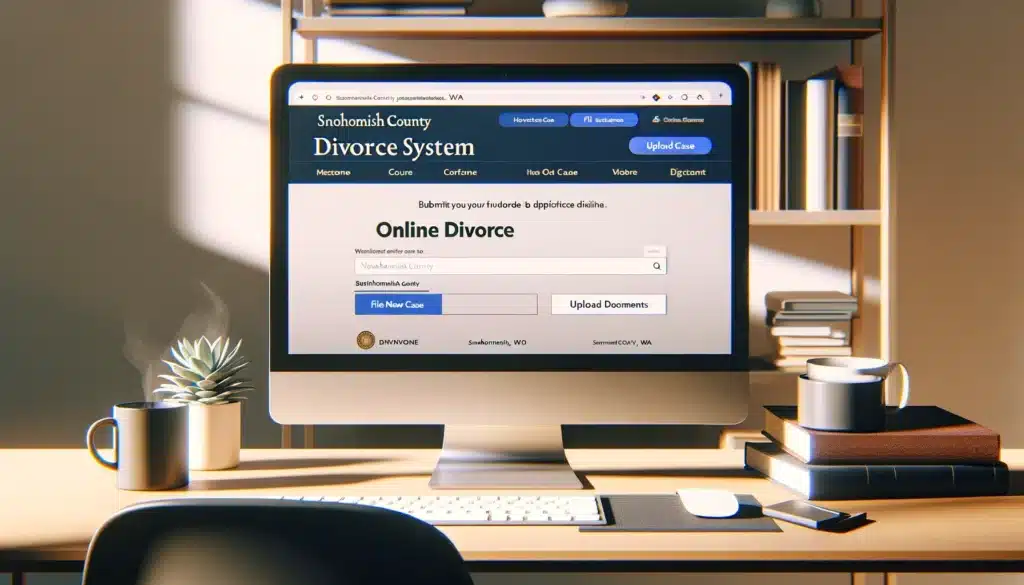Physical Address
304 North Cardinal St.
Dorchester Center, MA 02124
Physical Address
304 North Cardinal St.
Dorchester Center, MA 02124

uncharted territory. It’s not just about legal documents; it’s a significant life event. You’re at a crucial juncture, where each decision can significantly impact your future. In Snohomish County, the divorce process comes with its own set of unique challenges and specific requirements.
To navigate this journey effectively, understanding Snohomish County’s specific divorce laws is essential. This includes knowing the residency requirements and familiarizing yourself with the local court system’s procedures. We’re here to guide you through this process, offering clear, actionable advice tailored to Snohomish County. Consider this your roadmap, designed to simplify what might initially seem like a daunting journey.

Ready to start the divorce process in Snohomish County? Keep reading as we break down the essential steps, aiming to make your journey smoother and more straightforward. Let’s take this step together, moving towards new beginnings and brighter futures.
To get more info on filing for divorce in Washington, find a detailed overview in our article, How to File for Divorce in Washington.
To file for divorce in Snohomish County, Washington, you or your spouse must be a resident of the county. There are no specific length of residency requirements, but you must establish a substantial connection to the county. This means that you should have ties to the county such as owning property, having a job, or living in the county for a significant period. It’s important to note that residency requirements may vary depending on the specific circumstances of your case.
If you are unsure about the residency requirements or need more information, it is advisable to consult with a qualified attorney who specializes in family law in Snohomish County.
In Washington state, divorce is considered a no-fault divorce. This means that you do not need to provide evidence of fault or misconduct in order to obtain a divorce. The only grounds for divorce in Snohomish County is that the marriage is irretrievably broken. This means that there has been an irretrievable breakdown of the marriage and that there is no reasonable possibility of reconciliation between the spouses.
Unlike fault-based divorces where one spouse has to prove that the other is at fault, a no-fault divorce allows couples to end their marriage without assigning blame. This approach aims to simplify the divorce process and reduce conflict between the parties involved.
The concept of irretrievable breakdown of marriage recognizes that sometimes marriages simply cannot be saved, and it is in the best interest of both parties to move on. It acknowledges that attempting to maintain a dysfunctional or unhealthy relationship may cause more harm than good.
By embracing the no-fault divorce system, Washington state provides couples with a more equitable and less adversarial process for ending their marriage. It encourages cooperation and mutual respect, which can lead to smoother negotiations and better outcomes for both parties, especially when it comes to child custody, property division, and financial matters.
| No-Fault Divorce | Fault-Based Divorce |
|---|---|
| Does not require proving fault or misconduct | Requires proving fault or misconduct, such as adultery or abuse |
| Promotes cooperation and lessens conflict between spouses | Can lead to more contention between spouses |
| Faster and less expensive process | Can be a lengthier and costlier process due to the need for evidence and legal arguments |
| Focuses on the breakdown of the marriage rather than assigning blame | Assigns blame to one party, potentially causing animosity and hostility |
Filing for divorce in Snohomish County, Washington involves several important steps. By following these steps, you can ensure that the divorce process goes smoothly and efficiently.
Following these steps will help you navigate the divorce process in Snohomish County and move forward with your life. Remember to consult with an attorney or seek legal advice if you have any specific concerns or questions throughout the process.
When filing for divorce in Snohomish County, there are certain fees associated with the process. It’s important to understand the cost of filing for divorce and any additional miscellaneous fees that may be required. Here’s a breakdown of the filing fees in Snohomish County:
| Service Type | Fee | Notes |
|---|---|---|
| Filing fee for a new divorce case | $314 | – |
| Fee to modify an existing order | $56 | Applicable to Snohomish County cases |
Please note that the filing fees mentioned above are approximate and subject to change. It’s recommended to check with the Snohomish County Superior Court for the most up-to-date fee information.
If you are experiencing financial hardship and are unable to afford the filing fees, there may be options available to get them waived. It’s essential to explore the possibility of a fee waiver if you qualify. This can help alleviate the financial burden of filing for divorce in Snohomish County.
For more information on filing fees and the fee waiver process, it’s advisable to contact the Snohomish County Superior Court or consult with a legal professional.
If you are unable to afford the filing fees for divorce in Snohomish County, you may be eligible to have the fees waived. Obtaining a fee waiver can help ease the financial burden associated with the divorce process and ensure equal access to justice for everyone. To apply for a fee waiver, you will need to meet certain criteria and provide supporting documentation.
The eligibility requirements for a fee waiver in Snohomish County vary, but generally, they take into consideration your income level and financial resources. You will need to demonstrate that paying the filing fees would create a financial hardship for you. The exact criteria and documentation required may differ, so it’s important to check the Snohomish County Court’s website or contact their office for the most up-to-date information.
To support your fee waiver request, you may need to provide documents such as:
It’s essential to gather all the necessary documentation and complete the application accurately. Incomplete or incorrect information can delay the processing of your fee waiver request.
| Benefits of a Fee Waiver | Considerations |
|---|---|
|
|
By obtaining a fee waiver, you can waive the divorce filing fees and proceed with your case without the financial burden. It’s important to note that a fee waiver only covers the filing fees and not any additional costs associated with the divorce process. If you have concerns about other expenses, such as attorney fees or court-related costs, you may want to explore other resources or options, such as pro bono legal services or self-representation.
The court is located at:
3000 Rockefeller Ave, Everett, WA 98201, United States

If you’re looking to file for divorce in Snohomish County without the assistance of an attorney, you have options available to you. Self-representation, also known as filing pro se, allows you to navigate the divorce process on your own. While it may seem daunting, especially if you have little legal experience, with the right resources and guidance, you can successfully file for divorce without an attorney.
To start, it’s important to familiarize yourself with the specific requirements and procedures for filing pro se in Snohomish County. You can find valuable information on the Snohomish County Superior Court website, where they provide instructions and forms for individuals representing themselves in divorce cases.
Additionally, online divorce services can be a helpful tool for those choosing to file without an attorney. These services offer step-by-step guidance, document preparation assistance, and access to legal resources, which can greatly simplify the process. Be sure to research reputable online divorce services that are recognized in Washington State and are tailored to the specific requirements of Snohomish County.
Lastly, consider seeking support from local resources such as legal aid clinics or self-help centers. These organizations can provide guidance, assistance in completing forms, and answer any questions you may have about the divorce process in Snohomish County. They can also connect you with workshops or seminars that offer comprehensive information on self-representation.
To see how this process of filing for divorce in Snohomish County compares to that in other WA counties, check out our articles about how to file for divorce in Pierce County WA and filing for divorce in Spokane County WA.